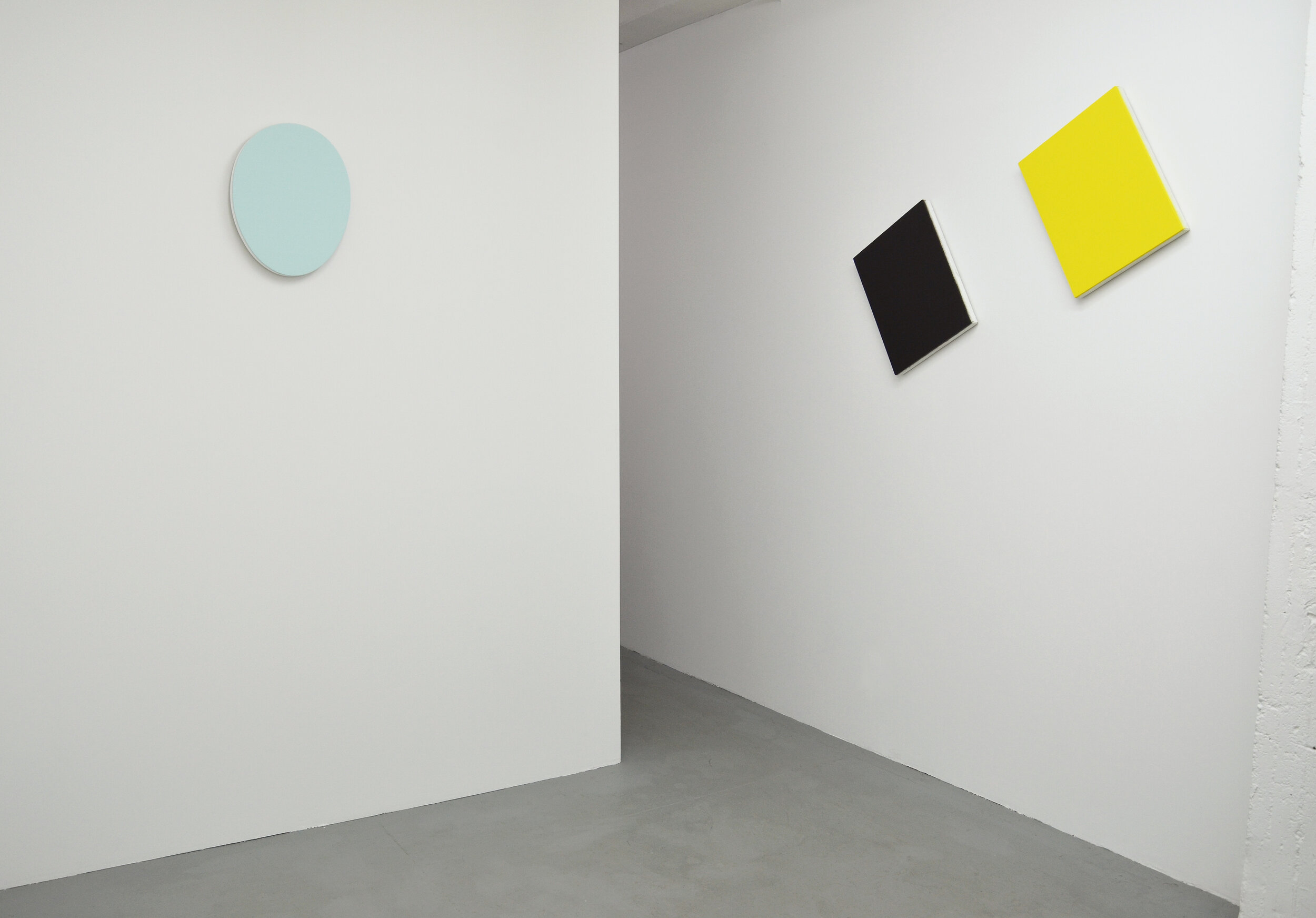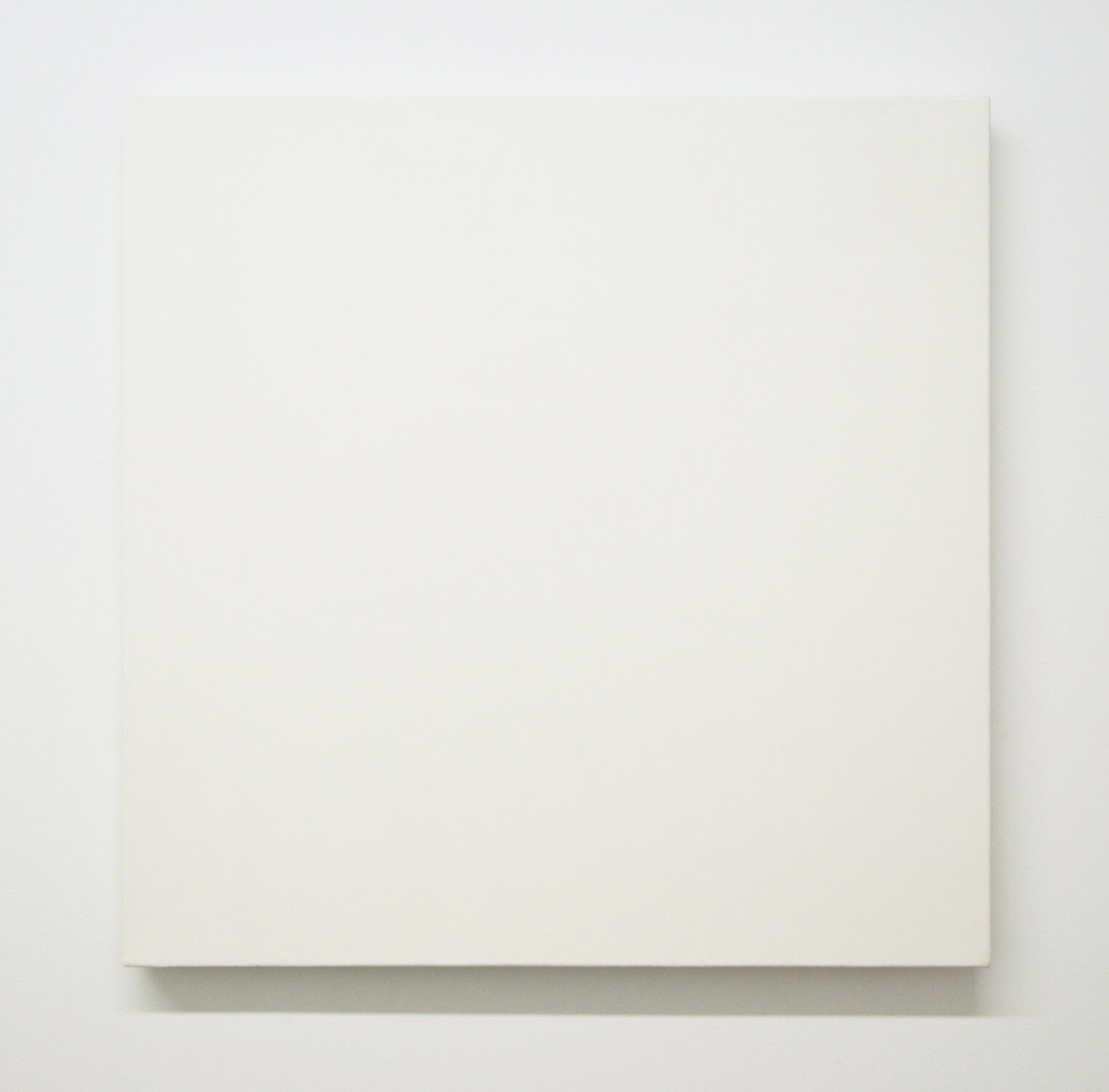Erik Saxon, P2 OFFW OL 11, 2011, Oil on linen, 19 x 15 inches, #ES09
Erik Saxon, BLK RECT YEL RECT OB OL 09, 2009, Oil on linen, 36 x 56 inches overall, #ES10
Exhibition view of Erik Saxon: Select Works, 1973-2011, MINUS SPACE, Brooklyn, NY, 2011
Erik Saxon, White Square 3, 1984-1985, Oil on canvas, 24 x 24 inches, #ES12
Erik Saxon, 4WS1OFFWRD CROSS OM, 1978-1979, Oil on masonite, 35 x 35 inches, #ES11
Erik Saxon, 15_R.SQ._GOU./BARK.P., 2015, Gouache on Mexican bark paper, 15.5 x 23.25 inches, 21.25 x 28.5 inches framed, #ES16
Erik Saxon, 07_R.RECT.H._GOU/P, 2007, Gouache on paper, 12 x 9 inches, #ES06
Erik Saxon, 05_RECT.OB._G/P, 2005, Graphite on paper, 23 1/2 x 16 inches, #ES05
Erik Saxon, 96_2RECT.1HOR.1VERT._G/BP, 1996, Graphite on bark paper, 23 1/2 x 16 inches, #ES04
Erik Saxon, 95_OV.CIR.OVLP_G/BP, 1995, Graphite on bark paper, 23 1/2 x 16 inches, #ES03
Erik Saxon, 86c._BLK.C.+BLK.SQ._GOU./RICE.P., c. 1986, Gouache on rice paper, 8.25 x 12 inches, 11.5 x 15.25 inches framed, #ES15
Erik Saxon, 74_Untitled_G/V, 1974, Graphite on vellum, 14 x 14 inches, #ES02
Erik Saxon, 74_Untitled_ACY/P, 1974, Acrylic on paper, 16 x 12 inches, #ES01
Biography
Erik Saxon (b. 1941, San Francisco, CA, USA) has exhibited his work internationally for the past forty years, including Belgium, France, Germany, Netherlands, Serbia, Spain, Sweden, Switzerland, and the United States. His work has been included in solo and group exhibitions at venues, such as Stark Gallery, Lorence/Monk Gallery, Florence Lynch Gallery (all NYC), Modernism (San Francisco, CA), Newspace (Los Angeles, CA), Galerie L’A (Liege, Belgium), Georgia Museum of Art (Athens, GA), Bowdoin College Museum of Art (Brunswick, ME), Cincinnati Museum of Art (Cincinnati, OH), Krannert Art Museum (Champaign, IL), Brevard Museum of Art and Science (Melbourne, FL), Sunrise Museum (Charleston, WV), Gibbes Museum of Art (Charleston, SC), Wilhelm-Hack Museum (Ludwigshafen, Germany), Raum für Malerei, artothek, Kolnisches Stadt Museum (all Cologne, Germany), Kunstverein Arnsberg (Arnsberg, Germany), Museum Gegenstandsfreier Kunst (Landkreis Cuxhaven, Germany), Mondriaanhuis (Amersfoort, Netherlands), Museum of Modern Art (Belgrade, Serbia), Museo de Arte Contemporaneo Esteban Vicente (Segovia, Spain), and Museo Cantonale d’Arte (Lugano, Switzerland).
Erik is most closely associated with the Radical Painting Group active in NYC during the 1970s and early 1980s. The group stressed a radical return to the core concerns of painting. The group’s other participants included artists Marcia Hafif, Dale Henry, Anders Knutsson, Joseph Marioni, Olivier Mosset, Phil Sims, Doug Sanderson, Susanna Tanger, Frederic Matys Thursz, Merrill Wagner, and Jerry Zeniuk, among others.
Erik’s work has been discussed and reviewed in publications, such as Artforum, Art in America, The New York Times, Brooklyn Rail, Village Voice, New York Observer, New York Sun, San Francisco Chronicle, Los Angeles Times, and Kolner Stadt-Anzeiger (Germany). His paintings and drawings are included in many public and private collections internationally, including the Museum of Modern Art (NYC), National Gallery of Art (Washington, DC), UCLA Hammer Museum (Los Angeles, CA), Yale University Art Gallery (New Haven, CT), Harvard Art Museums/Fogg Art Museum (Cambridge, MA), Göteborg Museum of Art (Göteborg, Sweden), Museo Cantonale d’Arte (Lugano, Switzerland), and Museum of Modern Art (Belgrade, Serbia). His work has been collected by Wynn Kramarsky (NYC) and Giuseppe Panza (Varese, Italy).
In addition to his studio work, Erik has written extensively. His essays and criticism have appeared in exhibition catalogs worldwide and have been published in magazines, such as Artforum, Art in America, and Appearances, among others. Erik holds an MA and BA from the University of California, Berkeley, CA.
Overview
For the past four decades, Erik Saxon has produced rigorous abstract geometric work, including paintings, drawings, prints, and sculpture. Born and raised in San Francisco, California, Saxon moved to New York in 1964, but returned to San Francisco in 1965 to earn his Masters degree. He permanently relocated to New York City in 1968. Between 1968-1973, he produced works that alternated between abstraction and abstract figuration. In 1973, he began exclusively making abstract work based on the grid format, initially using watercolor on paper and then industrial paint on raw canvas.
That same year Saxon began experimenting with monochromatic works – a series of acrylic drawings consisting of white and off-white squares arranged into groups of three to five panels – but tabled the idea a year later focusing his attention instead on paintings organized around a nine square grid structure (3 rows x 3 columns). With the intention of exploring “all possible variations within the picture plane”, the new grid works contained lines, rectangular bars, and squares, as well as the three neutral (white, gray, black) and three primary colors (red, yellow, blue). The grid paintings Erik produced between 1974-1977 are a critical development and define his core concerns for the next three decades.
In 1977, Saxon returned to the idea of the monochrome. His first monochromes consisted of multiple square and/or rectangular panels joined together forming a single shaped painting. Several years later in 1982, he produced his first all-white painting, which was conceived as a fusion of “an interior white square with the picture plane of the painting”.
For the past thirty years, Saxon has experimented broadly with the concept of the monochrome. He has worked with a wide variety of shaped painting supports, including squares, rectangles, crosses, circles, and ovals. He has produced single panel paintings, as well as diptychs and triptychs. His paintings commonly featured layered surfaces sometimes involving up to thirty successive layers of paint, which according to the artist, “frees the paint from its support enabling it to become an independent surface”.
During this time, Saxon also examined a painting’s relationship to the wall, the floor, its location within the exhibition space, and the viewer. Paintings are sometimes hung at an oblique angle to the floor or with the bottom edge of a painting positioned at eye level on the wall. In addition, he has analyzed the inherent tension between individual panels in a diptych or triptych, sometimes installing them abutted together horizontally or vertically, spaced apart at predetermined intervals, or positioned on the wall at a precise distance away from each other where the individual panels no longer relate.
Catalogs
Web Site
www.eriksaxon.com
Our Artsy Page
www.artsy.net/minus-space/artist/erik-saxon













